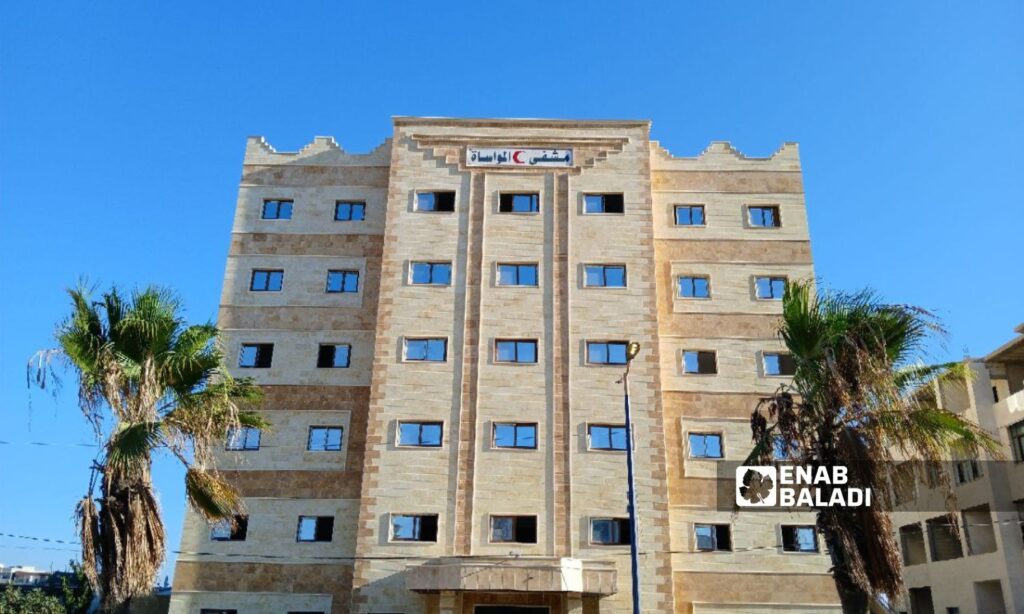Idlib – Samah Alloush
The number of private hospitals in Idlib, northwestern Syria, has increased over the past years, despite their high costs compared to the economic and living situation of the residents, providing at least an alternative or a solution for the difficulty some patients face in traveling to other places.
The number of private hospitals licensed by the Ministry of Health in the Syrian Salvation Government (SSG) in Idlib reached 27 hospitals, three of which are under preparation and construction, according to a statement received by Enab Baladi from Dr. Molham Ghazi, responsible for hospitals and medical centers in the ministry.
Ghazi explained that the number of hospitals providing free services in the region is 60 hospitals, approximately nine of which have completely lost funding, threatening to close and cease services to patients if the situation continues as it is.
“Securing doctors’ work”
Dr. Ziad al-Sayed, director of the private al-Mowasat Hospital and one of its investors, told Enab Baladi that private hospitals cannot be considered investments. Instead, they provide stability for doctors working in the area.
He added that relying on public hospitals as a source of income for doctors is not feasible since their funding may stop at any moment, and doctors may be forced to volunteer for two months or more to avoid losing their jobs there.
Most doctors are displaced from various areas in Syria and cannot rely on their private clinics as they did before in their hometowns, not to mention the high rental costs they face, which is a struggle in itself.
Regarding the services offered by the still-under-construction al-Mowasat Hospital, the doctor mentioned that private hospitals are essentially medical complexes for all specialties. For instance, someone injured in a traffic accident may need a cardiac or chest internal medicine consultation or anesthesia. They would have to be transferred from one hospital to another to get what they require because public hospitals do not offer all specialties. This is what the private hospital provides.
He pointed out the flexibility of dealing within the private hospital due to the presence of diagnostic services like radiology, laboratory, CT scans, MRI, and cardiac catheterization, as well as a comprehensive gynecology department staffed by female staff.
There are several requirements to obtain a license from the Ministry of Health. The doctor noted the cooperation and facilitation provided by the ministry, but there are some obstacles in terms of organizational matters imposed by the Idlib municipality, such as converting the building specification from residential to hospital. This cost the hospital administration $50,000 to change the specifications and obtain the license.
Money controls treatment
Private hospitals are considered a difficult dream for a large segment of the residents in the region due to their deteriorating financial conditions, which might force them to endure pain and suffering for years and worsen their health conditions, given that the daily wage for a worker, at best, is 100 Turkish liras (three US dollars).
About 5.1 million people live in northwestern Syria, 4.2 million of whom need assistance, and 3.4 million are food insecure. The recognized poverty threshold in northwestern Syria is 10,791 Turkish liras, and the extreme poverty line is 9,033 liras, according to the Syria Response Coordination Group (SRCG) team working in the area.
Patients in the region resort to charity pharmacies to get free medicines, most of which are expired, as they cannot afford to buy them. Enab Baladi observed severe overcrowding at some pharmacies offering free medicines (few in number in Idlib).
The medical sector in northern Syria suffers from a lack of capabilities and equipment due to funding stoppages, forcing many health facilities to reduce their operations, close sections, or reduce working hours due to the lack of funding. More than 110 health facilities, including 34 hospitals, have indeed stopped operations as of the end of last July.
If the trend of reduced funding continues, the health group warned that 50% of the health facilities operating in northwestern Syria will completely or partially stop functioning by December 2024, according to the UN Office for the Coordination of Humanitarian Affairs (OCHA).

